Council OKs mega-pardon for marijuana possession
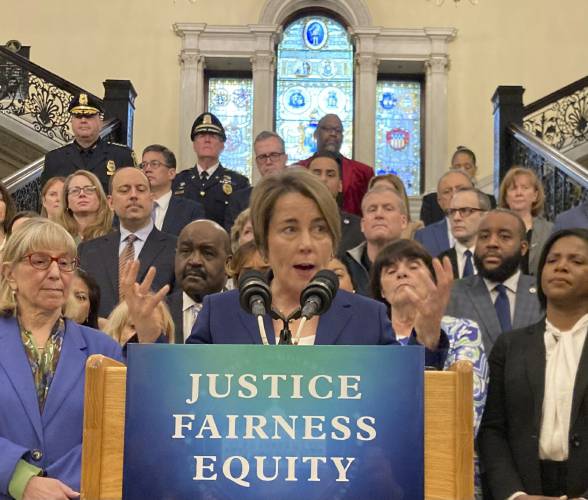
Massachusetts Gov. Maura Healey holds a news conference on March 13 at the Massachusetts Statehouse in Boston. ap
|
Published: 04-04-2024 2:20 PM
Modified: 04-04-2024 2:50 PM |
BOSTON — The Governor’s Council unanimously approved Gov. Maura Healey’s mass pardon Wednesday that grants official forgiveness to anyone convicted of simple cannabis possession in Massachusetts.
The courts must still work to identify people to whom the pardon applies and update their records, which one councilor called “an enormous task” that could require a shot of funding from the Legislature.
At an informational hearing prior to the vote, councilors spoke of the massive clemency act as historic on a national scale, and two supporting witnesses — a state representative and a prosecutor — said it was about “equity.”
“Massachusetts changed state laws around marijuana possession and this proposal is based on the simple premise of fairness and equity that a person should not bear the mark of conviction for an offense that is no longer a state crime,” Suffolk County District Attorney Kevin Hayden told the council, referring to the 2016 ballot initiative that legalized adult-use cannabis.
Rep. Carlos Gonzalez, co-chair of the Legislature’s Public Safety Committee, said “removing collateral consequences is an act of equity and justice” and that the mega-pardon “can uplift individuals, particularly those in Springfield and my communities which have been burdened by past convictions.”
The hearing was partly intended to address some lingering questions — not all of which received a crystal clear answer.
When Healey announced the pardon March 13, she described the action as applying to “hundreds of thousands” of people, and said the approximate figure was “extrapolated” from data. Lt. Gov. Kimberley Driscoll again referred to “hundreds of thousands” of people at the council assembly.
Councilor Terrence Kennedy of Lynnfield asked Hayden about the actual number of pardon recipients covered under the blanket action, noting that he heard the number “between 69,000 and 100,000” tossed around, and that Trial Court Chief Justice Heidi Brieger referred in a letter this week to “approximately 22,000 adult cases” contained in “electronic records.”
Article continues after...
Yesterday's Most Read Articles
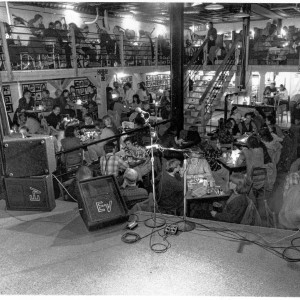 The Iron Horse rides again: The storied Northampton club will reopen at last, May 15
The Iron Horse rides again: The storied Northampton club will reopen at last, May 15
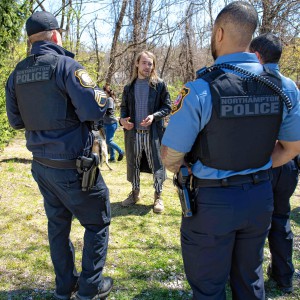 Homeless camp in Northampton ordered to disperse
Homeless camp in Northampton ordered to disperse
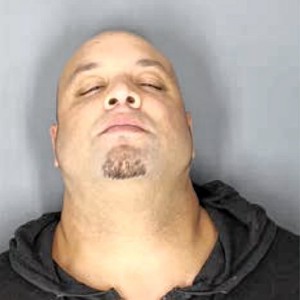 Authorities ID victim in Greenfield slaying
Authorities ID victim in Greenfield slaying
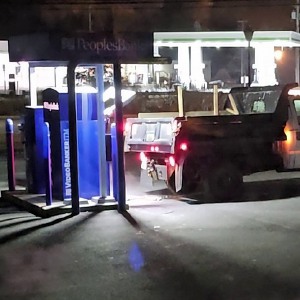 $100,000 theft: Granby Police seek help in ID’ing 3 who used dump truck to steal cash from ATM
$100,000 theft: Granby Police seek help in ID’ing 3 who used dump truck to steal cash from ATM
 UMass football: Spring Game closes one chapter for Minutemen, 2024 season fast approaching
UMass football: Spring Game closes one chapter for Minutemen, 2024 season fast approaching
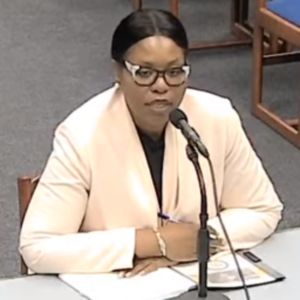 Final pick for Amherst regional superintendent, from Virgin Islands, aims to ‘lead with love’
Final pick for Amherst regional superintendent, from Virgin Islands, aims to ‘lead with love’
“Don’t you think we should be making more of an effort to find those other people, and who they are? Most people that have a marijuana conviction don’t know what’s going on in this room today, and never will,” Kennedy said. “They’re not going to get on a portal and fill out a form to get a pardon document. They’re not going to be writing on a job application that they’ve been pardoned. Because they’re never going to know it unless we reach out somehow. Don’t you think we should be doing more?”
“We should be doing as much as possible, I think,” Hayden replied. “And I don’t mean to be glib, but thankfully that’s a problem I don’t have to worry about. That’s for the governor and probation office to worry about. ... We expressed this concern at the time that the issue was raised. It should be as automatic as possible.”
Healey and Driscoll have been clear that no action is needed on the part of recipients to receive their pardon, though they may apply for an optional pardon certificate if they wish to.
“The exciting thing is, no one is required to take any additional action,” Driscoll said after the assembly. “They are pardoned, effective at the Governor’s Council vote.”
In Brieger’s letter, she told Healey’s chief legal counsel, Paige Scott Reed, that “[f]or the past several weeks, we have been planning for the potential need to update court records” and reported “productive collaboration” between the Trial Court, the state Probation Service, and the governor’s office.
The Trial Court chief justice also outlined her understanding of the process moving forward, while telling Scott Reed that she “respectfully decline[d]” to testify in person.
Normally, a pardon recipient initiates the process for themselves by applying for clemency. In this extraordinary case, the government will attempt to identify who, exactly, was pardoned on Wednesday.
The Trial Court will generate a list of cases that “may be eligible for the Governor’s pardon,” Brieger wrote in the letter, which was read aloud by Driscoll at the outset of the hearing. She added that “updates will be undertaken at a deliberate pace in the ordinary course upon request from the Governor.”
“The Governor’s Office will use the list in two ways: (1) to review individual cases and make eligibility determinations for pardons; and (2) to verify information submitted to the Governor’s Office by individuals requesting a pardon certificate. In both instances, the Governor’s Office will provide to the Trial Court and [Massachusetts Probation Service], on a reasonably-paced and ongoing basis, the information pertaining to the individuals the Governor’s Office has determined are eligible for a pardon. MPS and Trial Court Clerks will update their records accordingly,” Brieger wrote.
Brieger said she believed the Trial Court and MPS “can take the necessary next steps to effectuate the pardon on our respective records without undue burden.”
Some councilors underscored that a pardon alone does not remove the cannabis possession conviction from a person’s criminal record, though would note on the record that it had been forgiven.
Councilor Tara Jacobs said she recently learned the distinction between a pardon and expungement, a process which individuals would need to apply for that scrubs the record clean.
As far as “really trying to get it really off people’s records,” Kennedy told Gonzalez it could be an area for future legislation.
“And I think you should take it back to the House and ... consider with your colleagues seeking some legislation,” Kennedy said, adding that would take the umbrella forgiveness of marijuana possession convictions “to the next step.”
Healey said in a statement Wednesday afternoon that “Massachusetts made history today,” adding her thanks to the council and to President Joseph Biden “for his leadership on this issue.”

 Authorities ID victim in Greenfield slaying
Authorities ID victim in Greenfield slaying  Federal probe targets UMass response to anti-Arab incidents
Federal probe targets UMass response to anti-Arab incidents Locking up carbon for good: Easthampton inventor’s CO2 removal system turns biomass into biochar
Locking up carbon for good: Easthampton inventor’s CO2 removal system turns biomass into biochar William Strickland, a longtime civil rights activist, scholar and friend of Malcolm X, has died
William Strickland, a longtime civil rights activist, scholar and friend of Malcolm X, has died
